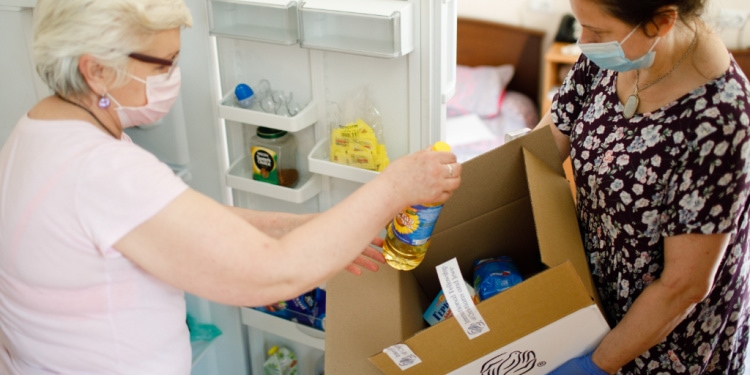Making Connections in a Time of Isolation
The Fellowship | November 5, 2020

There is a custom on Sukkot, the week-long festival that Jewish people celebrated in early October, called “ushpizin.”
This strange sounding word is Aramaic for “guests.” Every day of the Sukkot holiday many Jewish families invite one of seven biblical guests into their sukkah – the temporary dwelling built for the holiday – with a special ceremony. These guests are the founding fathers of Judaism: Abraham, Isaac, Jacob, Moses, Aaron, Joseph, and David. Of course, these personalities do not literally appear before us, but we can feel their spirits with us and remember that we are a link in the long chain of the Jewish people.
Welcoming the Ushpizin
I thought about this custom last spring during another holiday, Passover. My husband passed away last December, and I could not even spend Passover with my three married children because the holiday occurred during Israel’s first coronavirus lockdown. So instead of being surrounded by beloved family members, I sat at the Passover seder table by myself.
I did what I could to make the best of it. As I drank the Passover wine and read my Haggadah (the special book that tells the Passover story and includes prayers and songs), I invited my own “ushpizin” for the seder, even though it is a custom that belongs to a different holiday. I welcomed my husband, my parents, and my grandparents, who have all left this world, and they kept me company during the strangest Passover I have ever experienced. I remembered all the Passovers in the past and dreamed about the Passovers of the future, when I will be with my children and grandchildren and the coronavirus will be gone forever, just a distant memory.
Our Worlds Become Smaller
During these times of isolation, I’ve also thought a lot about all the people The Fellowship helps, many of whom are alone. We work together with partner organizations to aid isolated Holocaust survivors both in Israel and the former Soviet Union. We deliver food and medication, provide transportation to medical appointments, and run many more projects to benefit people living in poverty who have no one else to help them.
Our worlds have become so much smaller because of the lockdowns. When we are far away from close family members who do not live with us, and we cannot visit them, we can relate more than ever to The Fellowship’s beneficiaries who are alone with no family nearby to help them or keep them company.
Lifting People Up
On the same Passover night that I described earlier, one of my neighbors organized a sing-along. In the evening, all the neighbors came outside in front of their houses in their masks and sang Passover songs together. In the midst of my strange solo seder, I was suddenly uplifted by the voices of my neighbors as we sang together to celebrate the Festival of Freedom.
I like to think that’s one of the things we do at The Fellowship – we lift people up and help break through their isolation, isolation that has become so much a part of our experience. I feel lucky to work for an organization that does so much good for people, especially when there are so many in need. The Fellowship gives each beneficiary a virtual hug with every food package or supermarket voucher we deliver. It reminds me that we all have something to give each other. None of us is really alone.
- Miriam Lock is a staff member in The Fellowship’s Jerusalem office
